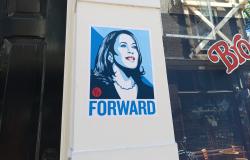The Vice President Who Wouldn’t Fight (Not Even Talk)

Kamala Harris calls Biden’s 2024 run reckless. Robert Schuett argues the greater recklessness was her own silence — and the Democrats’ abdication of leadership that still weakens American democracy at home and abroad.
Kamala Harris has chosen the safest moment to find her voice: when it no longer matters. In her forthcoming memoir, 107 Days, she castigates Joe Biden’s 2024 re-election bid as “reckless.” Yet the real revelation is not about Biden. It is about Harris herself. It is about a vice president who kept her head down when the country needed her to speak, and who now postures as the voice of hindsight.
Harris argues that she was in “the worst position” to confront the president about running again, that doing so would have looked like betrayal. This is self-exculpation dressed up as loyalty. Vice presidents are not ceremonial ornaments. Dick Cheney dominated foreign policy in George W. Bush’s first term. Even Mike Pence, under extraordinary pressure, proved on January 6th that a single decision from the second-in-command matters. Harris’s suggestion that she was powerless does not convince. She was in the best position of anyone to tell Biden the truth. No one else could.
The deeper problem is that Democrats as a whole treated Biden’s candidacy like a family heirloom rather than a public responsibility. Again and again, party leaders repeated the mantra: “It’s Joe and Jill’s decision.” As though choosing the occupant of the Oval Office were akin to deciding who takes over the family farm. In parliamentary democracies, leaders are evaluated constantly and, when necessary, pushed aside. Thatcher, Schmidt, May, Johnson, Truss — none waited for a general election to be tested. By contrast, America’s governing party outsourced the most consequential political decision in the world to an elderly couple in Delaware.
Harris now seeks to portray herself as the realist in the room, the one who saw Biden’s vulnerabilities before anyone else. But realism without action is cowardice. To keep silent in order to protect one’s own future, to hope that history will take care of itself, is not loyalty. It is abdication.
This is precisely where the wisdom of Hans J. Morgenthau, the great realist of international politics, cuts to the bone. Morgenthau, a student of Hans Kelsen in Geneva during the 1930s, insisted that the first duty of a statesman is brutally simple: “He must lead.” Comfort, reputation, and sentiment are secondary. Without leadership, a politician will achieve little at home and invite calamity abroad. Being remembered as a good fella or good sport may satisfy the family photo album, but it is no substitute for responsibility. In a letter to Hannah Arendt, Morgenthau went further, describing the need for “intellectual street-fighters” in politics: someone willing to show which side of the barricades he or she stands on.
Harris’s memoir, then, is less an indictment of Joe Biden than a mirror held up to a party that shrank from its responsibility. She is not the only one guilty of waiting for others to act. But her case is emblematic, because she occupied the one office designed precisely for such a moment and chose instead to remain silent.
The recklessness lay not only in Biden’s determination to run again — what else would one expect from a man who has spent his entire life in politics, a realm where power is always twinned with personal and political ambition? It lay equally in Harris’s passivity, and in a party that indulged the fantasy that succession in a republic could be treated like a private family matter.
Harris wanted to tell us that she saw the dangers sooner than others. What she has told us instead is that she lacked the courage to face them. This is not how political parties in strong democracies behave. Leadership demands more than retrospective wisdom. It requires the nerve to act, the courage to confront, and the willingness to fight for a political future. Without that, America will continue to drift, and the international order that still depends on leadership from Washington will drift with it.
Unless the Democrats quickly produce a leader who combines intellect with street smarts and a mastery of the political drill, the game is up — for America and for the rest of the free world.
Robert Schuett is co-founder and managing partner at STK Powerhouse, a global risk advisory firm. A former Defence civil servant, he also serves as Chairman of the Austrian Political Science Association and is a long-standing Honorary Fellow at Durham University. He is the author of Hans Kelsen’s Political Realism (2021).
Image: Ceescamel via WikiCommons CC0


